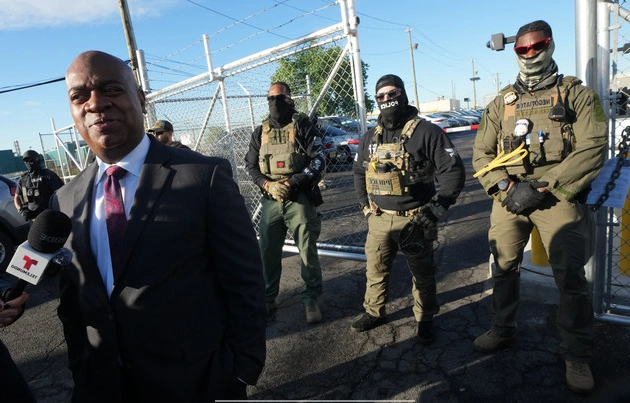
Newark Mayor Ras Baraka’s Friday arrest at an ICE facility in Newark ignited a firestorm among liberal Democrats and immigration activists, transforming his stint in federal custody into a pivotal political episode for progressives and the local community. The incident not only bolstered Baraka’s national standing as he vies for the governorship but also galvanized a wave of support from various political figures and grassroots movements.
Political Mobilization and Unity
The rallying cry of “Free Ras Baraka! Free Ras Baraka!” echoed outside the federal facility where the mayor was detained, symbolizing a unified front in support of his cause. Baraka’s arrest, stemming from a protest outside an immigration detention center, resonated deeply with a segment of Democrats striving to counter President Donald Trump’s stringent immigration policies.
Democratic leaders, including Hakeem Jeffries and Chuck Schumer, voiced solidarity with Baraka, while the mayor of Chicago demanded his immediate release, citing Baraka’s inspirational leadership. Teresa Ruiz and other New Jersey lawmakers stood in solidarity with Baraka, emphasizing the importance of due process and constitutional rights amidst a challenging political climate.
Broader Political Implications
Baraka’s arrest transcended local boundaries, drawing attention from leaders beyond Newark. Elected officials from New York, such as Zohran Mamdani and Brad Lander, crossed state lines to stand in support of the embattled mayor. Mamdani highlighted the need for unwavering support in times of adversity, contrasting Baraka’s steadfastness with a more collaborative approach to political challenges.
The narrative surrounding Baraka’s arrest underscored not only immigration issues but also the exercise of executive authority, positioning him at the center of a contentious debate. While his rivals in the upcoming gubernatorial race sought to capitalize on the momentum generated, the response from various quarters remained mixed, reflecting the complex political landscape.
Community Engagement and Political Discourse
The arrest reverberated across communities, prompting discussions on democracy, civic rights, and the role of elected officials in upholding these values. Members of Congress, including Rep. Josh Gottheimer and Rep. Mikie Sherrill, condemned the Trump administration’s immigration policies and expressed solidarity with Baraka’s cause.
Despite differing political affiliations, the arrest prompted a reevaluation of government actions and their implications for democratic norms. The energized response to Baraka’s detention underscored the need for civic engagement and vigilance in safeguarding constitutional liberties.
Future Implications and Electoral Dynamics
As the political fallout from Baraka’s arrest unfolds, questions linger about its impact on the upcoming elections and the broader discourse around immigration and governance. While the incident mobilized a segment of voters, its resonance with moderate constituents remains uncertain, with potential repercussions on Baraka’s electoral prospects.
The evolving narrative surrounding the arrest underscores the complexities of contemporary politics and the challenges faced by leaders navigating contentious issues. Baraka’s steadfastness in the face of adversity has elevated him to a national platform, redefining the contours of political discourse and civic engagement.











